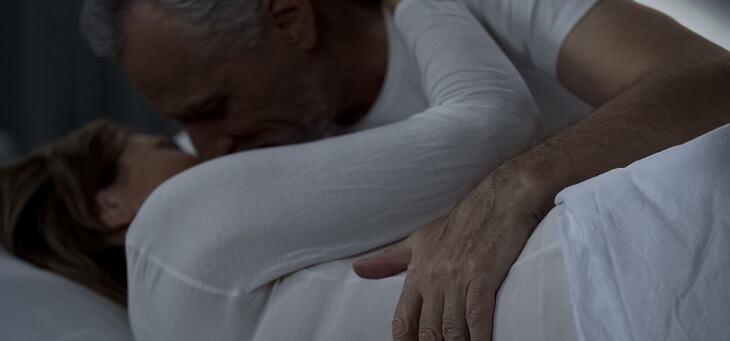For many people, maintaining their sexuality as they age is an important part of their lives. But older adults may find they experience unique issues when it comes to their sex lives, issues that they haven’t had to deal with before.
Sexuality is often affected by one’s emotional and physical state. How you physically feel may affect what you are able to do and how you emotionally feel may affect what you want to do.
Many older couples find greater satisfaction in their sex lives than they did when they were younger. They may have fewer distractions, more time and privacy, and no worries about getting pregnant. They also may be better able to express what they want and need, which can offer an opportunity for greater intimacy and connection.
However, ageing can also bring physical changes that can sometimes interfere with the ability to have and enjoy sex. As we age, our bodies change, including our weight, skin, and muscle tone.
Read: How to feel sexy after 60
Some older adults don’t feel comfortable in their ageing bodies. They may worry that their partner will no longer find them attractive. Health conditions can cause physical problems, along with stress and worry, that can get in the way of intimacy or enjoying a fulfilling sex life.
Fortunately, a lot of these issues have solutions. Here are six of the most common sexual concerns for those over 50 and what to do about them.
Difficulty becoming aroused
There are many potential causes of this problem, including medication side-effects, underlying health conditions, and psychological issues.
If there is no medical cause, you may want to try using a lubricant during sex, focusing on stimulating activities other than intercourse, or talking to a therapist to explore any psychological issues that may be affecting your sexual response.
Physical changes in your body
Talk openly with your partner about the changes you are experiencing but don’t place any blame on yourself or your partner. Take time to enjoy each other and to understand the changes you both may be facing.
This time in your life can be an opportunity to form more intimate bonds and explore your sexual relationship in a new way.
If you sense changes in your partner’s attitude towards sex, don’t assume they are no longer interested in you or in having an active sex life with you. Open up about how you’re feeling and try to come to a solution, many of the things that cause sexual problems in older adults can be rectified.
Difficulty maintaining an erection
With age, erectile dysfunction (ED) becomes more common. ED is the loss of the ability to have and keep an erection, and the erection may not be as firm or as large as it used to be. ED is not a problem if it happens every now and then, but if it occurs often, talk with your doctor.
There are numerous effective medical treatments and therapies that can help with the condition. But for those seeking a more natural remedy, the Mayo Clinic suggests lifestyle changes that may help, such as losing weight, quitting smoking, limiting alcohol intake, increasing exercise and lowering daily stress.
Read: Australians say the internet has been good for their sex lives
Pain during intercourse
Two common body changes that older women experience are related to the sex organs. The vagina can shorten and narrow, and the vaginal walls can become thinner and stiffer. For most, there will be less vaginal lubrication, and it may take more time for the vagina to naturally lubricate itself. These changes could make certain types of sexual activity, such as vaginal penetration, painful or less desirable.
Lubricants can help moisten the vagina during sex, choose fragrance-free, water-based lubricants to prevent adverse reactions.
If that doesn’t work a vaginal moisturiser may be in order. Avoid douching, as it can also cause vaginal dryness. Your doctor may also recommend medication such as low-dose vaginal oestrogen if moisturisers and lubricants are ineffective.
Lack of interest in sex
A decreased libido is another common concern for those over 50. Hormonal and body changes can make us feel all sorts of ways, and sometimes, sexy is just not one of them. There can be many causes of decreased libido, including depression and anxiety. First, talk to your doctor to rule out any medical issues and then focus on connecting with your partner and discovering or re-discovering ways you can enjoy each other.
Read: Is your sex life ageing well?
Difficulty climaxing
Many people experience increasing difficulty achieving orgasm as they age. Hormones tend not to be as reliable as they used to be, bodies can hurt, and medical conditions, medications and even worrying about not reaching orgasm can all contribute to the problem.
Trouble breathing when your partner is on top, a knee ache when you are, it can all happen. But you’re not alone, 75 per cent of women of all ages do not reach orgasm solely through penetration and many older men experience difficulty with orgasm and ejaculation. One study found the problem affects as many as 16 per cent of men in their early 60s, 23 per cent of men ages 65 to 74, and 33 per cent of men 75 and older.
While sexual desire and function may certainly ebb and flow throughout your life, there’s no reason to move sex to the back burner simply because of your age. You can have great sex in the later years of your life so if you encounter issues, bring them up with a health care professional to allow you to reclaim your sex life.
Can you add to the conversation? Share your thoughts or experiences in the comments section below.
Disclaimer: This article contains general information about health issues and is not advice. For health advice, consult your medical practitioner.

